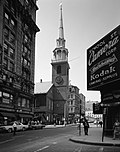Phillis Wheatley
Phillis Wheatley (c.1753 – December 5, 1784) was a poet. She was the first African-American woman to have a book published. She was born in West Africa, probably in Gambia. She was captured and made a slave in the United States when she was about seven years old on a slave ship called The Phillis.[1]
Her master and his wife taught her how to read and write. Wheatley wrote her first published poem when she was 13. She wrote over 100 poems in her life.[2]
Although she was an African slave, Phillis Wheatley was one of the best-known poets in America.[3] In 1770 Wheatley wrote a poetic tribute to the evangelist George Whitefield. A lot of people said good things about the poem. In 1773 a collection of 39 poems Wheatley had written, Poems on Various Subjects, Religious and Moral by Phillis Wheatley was published. It was the first book by an African American woman to be published. The book made her famous in England and the America colonies. There was a poem in the book about a slave trader who brought people from Africa to America. Wheatley's mistress, Mrs. Wheatley, died on October 18, 1773. At this point Wheatley did not have to do household chores anymore. Yet, it was not until 1778 that she was set free when her master, John Wheatley, died.[4] That year she married John Peters. Peters was a free black grocer. They had two children. Both of them died when they were babies. Her husband got put in prison in 1784 for debt. After this Wheatley became very poor. Wheatley died of illness in 1784 in Boston. She was 31 years old.[5]
Early life
Phillis Wheatley was born around 1753 in Gambia, Africa. She was captured by slave trader and brought to America in 1761, which she was only a seven or eight years old young girl.[6] When she arrived America, she got sold to the Wheatley family in Boston, Massachusetts. The reason John Wheatley purchased her was that he needed some young girls to serve his wife, who had weak body. In addition, the Wheatley family educated her. After sixteen months, she could read the Bible, and other books in three different languages. The Wheatley family saw her talent, so they allowed her to focus on her studies. When she was fourteen years old, she began writing poetry and published her first poem in 1767.
Her marriage and life after marriage
On April 1, 1778, Wheatley married John Peters, a handsome and well-mannered free black. They knew each others for five years, then they married. He liked to call himself Dr. Peters, practicing law and keeping a grocery store at the court. But his business did not work well and failed to match his dream. Soon after their marriage, they moved to Wilmington, Massachusetts. Shortly after returning to Boston, they set up their home in the run-down section of the city.[7] Since John Peter could not find a job and they became very poor. She had three children with John Peter but they all died when they were still babies. John Peter's debt forced Wheatley to go to work as a chairwoman.
Her writing style
Her writing style came from different places. It also embraced the elegy, likely from her African roots. It was the role of girls to sing and perform funeral dirges. Religion was also a key influence, and it led Protestants in America and England to enjoy her work. Wheatley’s poems reflected several influences on her life.[8] She was very against slavery, and said that all people should have freedom.
For example, she said America should be set free from England, and African Americans should be set free from slavery. She wrote several letters to ministers and others on liberty and freedom. That shows she put her beliefs in her letters and her poems to tell the people what she thinks is right.
Legacy
Two of Wheatley's writings were printed after she died. Vincent Carretta wrote a book about Wheatley's life called Phillis Wheatley: Biography of a Genius in Bondage. It was published in 2011.[9] In 2012, Robert Morris University named the new building for their School of Communications and Information Sciences after Phillis Wheatley.[10] A statue of Wheatley is part of the Boston Women's Memorial on Commonwealth Ave in Boston.
Phillis Wheatley Media
Phillis Wheatley's church, Old South Meeting House
On being brought from africa to america
Phyllis Wheatley YWCA in the Shaw neighborhood of Washington, D.C.
References
- ↑ Doak, Robin S. Phillis Wheatley: Slave and Poet, Minneapolis: Compass Point Books, 2007
- ↑ "Wheatley Biography". archive.vcu.edu.
- ↑ Foundation, Poetry (2019-04-24). "Phillis Wheatley". Poetry Foundation. Retrieved 2019-04-24.
- ↑ Women's Political and Social Thought: An Anthology by Hilda L. Smith, Indiana University Press, 2000, page 123.
- ↑ Phillis Wheatley: America's second Black Poet and Her Encounters with the Founding Fathers by Henry Louis Gates, Basic Civitas Books, 2003, page 5
- ↑ "Phillis Wheatley". Biography. Retrieved 2019-05-14.
- ↑ "Who was Phillis Wheatley? Everything You Need to Know". www.thefamouspeople.com. Retrieved 2019-05-14.
- ↑ "Phillis Wheatley". National Women's History Museum. Retrieved 2019-05-14.
- ↑ https://www.amazon.co.uk/Phillis-Wheatley-Biography-Bondage-Publication/dp/0820333387
- ↑ "Dual success: Robert Morris opens building, reaches fundraising goal". Pittsburgh Post-Gazette.

